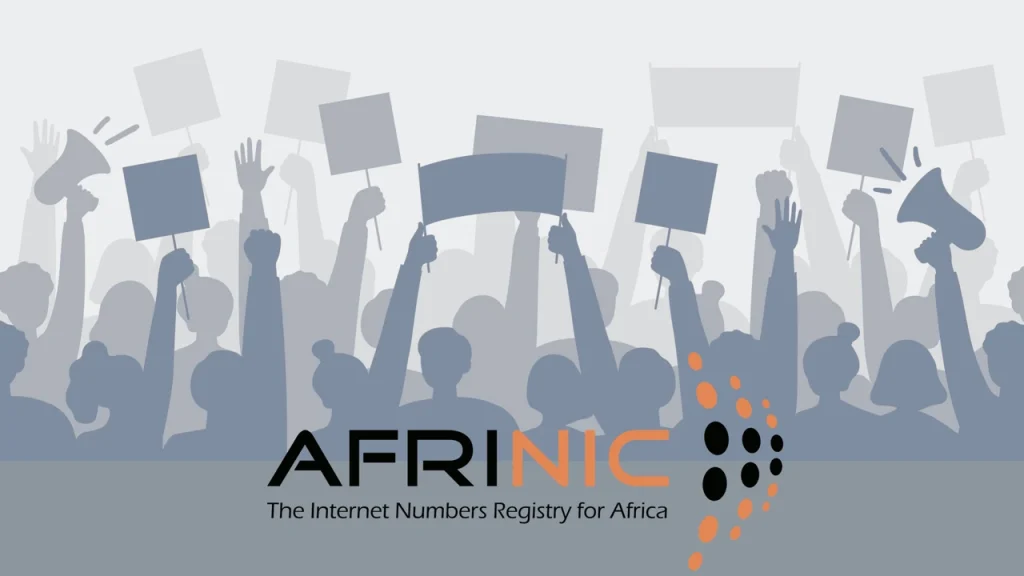- AFRINIC cancelled its June 2025 board elections after disqualifying hundreds of valid proxy votes, prompting backlash.
- ICANN intervened with a court order, demanding procedural transparency and urgent reform of AFRINIC’s governance process.
Crisis of trust: A cancelled vote sparks controversy
On 23 June 2025, AFRINIC attempted to hold its first in-person board election since being placed under court receivership in 2022. Just before the voting concluded, the NomCom raised concerns about an unverified proxy submission and instructed members to disregard around 800 proxy ballots. As a result, the entire election process was halted and officially cancelled. While proxy voting was procedurally valid, the mass invalidation raised serious concerns among members about transparency and overreach, sparking allegations that internal controls were being used to sideline opposition voices.
In the background, ICANN had already been pressuring AFRINIC to conduct a fair and timely election. It issued a formal call for procedural reforms, including the reconstitution of the NomCom, proper information disclosure to members, and safeguards against administrative interference. Despite this, the court-appointed Receiver, Gowtamsingh Dabee, postponed the election indefinitely—citing security and governance issues. What should have been a milestone for institutional recovery instead descended into a highly political impasse.
Also read: Cloud Innovation calls for AFRINIC wind-up after ‘impossible’ election standards
Also read: ICANN’s letter to AFRINIC: Fair election oversight or a blow to African self-governance?
Litigation and the breakdown of authority
AFRINIC’s troubles date back to 2021, when it became embroiled in legal disputes with Cloud Innovation. The resulting litigation led to the freezing of its bank accounts, paralysis of operations, and prolonged governance vacuum. Multiple court rulings affirmed Cloud Innovation’s legal right to its IP resources, undermining AFRINIC’s arguments about abuse of allocation. As the organisation struggled to stay afloat, key functions—such as resource management and elections—fell into stasis.
Critics argue that AFRINIC’s current leadership, operating under court supervision, has weaponised administrative and legal processes to maintain control rather than facilitate legitimate governance. The cancelled election is not just a technical delay—it represents a deeper institutional crisis. For the small ISPs and African operators relying on AFRINIC for resources, the political entanglement means lost representation and an eroded voice in regional internet governance.
Also Read: Cloud Innovation calls for AFRINIC wind-up
Also Read: AFRINIC at a crossroads: Can Africa’s internet custodian still deliver on its mission?
Political interference masquerading as due process
While proxy ballots were procedurally valid, AFRINIC’s move to discard them en masse—citing security concerns—was widely seen as politically motivated. Observers note that the decision lacked clear justification and was selectively enforced. Rather than ensuring fairness, the action effectively blocked one side from participating, raising red flags about internal impartiality.
Meanwhile, ICANN escalated its involvement. On 6 June, it publicly urged AFRINIC to fix its electoral process, and on 19 June, it secured a Mauritian court order compelling the Receiver to issue a communiqué to members, reform the NomCom, and commit to holding elections without undue delay. This episode underscores a broader tension: when a regional registry falls into legal turmoil, internal safeguards may be insufficient to prevent politicisation of democratic processes like board elections.
Also read: Timeline of the AFRINIC vs Cloud Innovation Ltd dispute
Also read: AFRINIC elections 2025: Everything you need to know
An institutional breakdown demands structural reform
The failure to hold a clean election has broader implications than just delayed governance. It signals the weakening of AFRINIC’s institutional backbone. With critical functions suspended, legal and political interference unchecked, and its mandate questioned, AFRINIC is now seen less as a steward of Africa’s internet and more as a contested arena of power.
To restore credibility, AFRINIC must prioritise structural reform. That includes establishing an independent electoral committee, enforcing transparent and consistent voting protocols, and reducing judicial dependency in internal matters. Most importantly, elections must once again become mechanisms for representation—not instruments of control. Only through depoliticising its core functions can AFRINIC reclaim its legitimacy and resume its role in supporting Africa’s digital growth.

